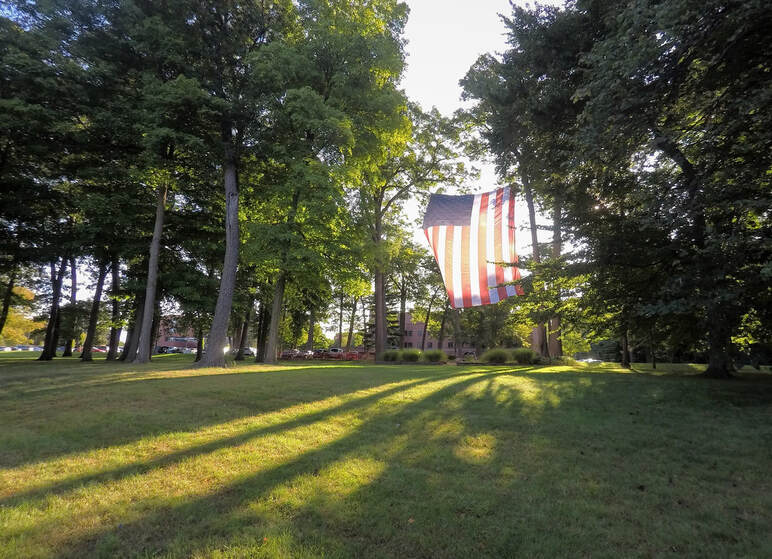|
11/25/2020 A Walmart Love Story by Maxim Matusevich G Witteveen CC A Walmart Love Story Petite filet mignons at Walmart Supercenter in Honesdale, Pennsylvania sell at eleven dollars and eighty-two cents a pound. I pick up four wrapped in plastic film, and place them in the cart next to the romaine lettuce and two organic English cucumbers. There are non-organic cucumbers in the adjacent section, and they are a dollar eighty-five each, as opposed to two dollars and ninety-six cents for the organic ones. Eleven eighty-two, one eighty-five, two ninety-six. How do they ever come up with these figures? I overpay for organic produce, because overpaying at Walmart Supercenter is really a sign of class. Or hubris. Or aspiration. Or my recently acquired class consciousness. The woman in the cereal aisle draws up her cart next to mine, then overtakes me – I’m moving too slowly, and violating the six-feet rule is her way of alerting me to this fact. She probably drives the same way – one of those perpetually honking tailgaters, always in a rush, forever annoyed with us, the five-miles-above-the-speed-limit drivers. The woman sports snugly fitting camo pants covering the tops of her grey Caterpillar work boots. She is so unapologetically busty that I immediately suspect an outside intervention. The prominence of her breasts is accentuated by a tight, pink Women for Trump t-shirt. I try to avert my eyes, but there is a magnetic quality to the woman’s proximity, and I can’t avoid the sight of the outsized white capital letters, pushed forth by the assertive power of her flesh. Her hair is bleached and ponytailed, her skin deeply tanned, and a forlorn-looking Jesus on the cross is inked on her forearm. She wears a mask the color of the American flag. Actually, she doesn’t, it’s some other mask, but I can’t help seeing stars and stripes – the stripes are faded, the stars emit an unsteady whitish glow, traveling at a speed of light from some distant galaxy. Everything about her is just so tight, so seamlessly assembled. I’m certain she hunts, and I can easily visualize the truck she drives. Her in-your-face sexuality strikes me as determined but self-conscious; she looks so tough, but at the same time strangely vulnerable. The mixture of girlishness (pink), militarism (camo pants), voluptuousness (her boobs), rightwing politics (the white lettering), religion (Jesus on the cross), counterculture (Jesus on the cross). I wonder if she prepped for this Walmart stop, conceived it as a statement of purpose. How carefully did she choose her outfit? DID she choose it? I wonder what she makes of me. Did she even notice? Or was I just a slowly moving obstacle to be honked at and pushed aside, out of the fast lane? We might fall in love, and fall hard. We’re so different, but drawn together by the power of opposite attraction. I can see myself hunched over on a plastic chair inside that rundown laundromat at the corner of High and Church, waiting patiently for the droning dryer to stop. I’ll carefully fold her undies, her tube socks, and, extra carefully, the pink t-shirt with the white capital letters: the “T,” the “W.” These laundry rituals are like the most boyfriend thing in the world. A dollar seventy-five per load, plus another dollar twenty-five for the dryer. (Again, the dollar amounts mystify me. How do they ever come up with these figures?) I think of that old Soviet film that I always loved – “The Forty-First.” A story of doomed love between a Bolshevik sniper and the wounded White Guard officer whom she captures. The most romantic film ever. She loses her head over him and even tosses aside her lethal weapon, which had previously claimed the lives of forty other White officers. But this one is different – he’s still an enemy, but also the love of her life. You watch the film and wish so desperately for the merciless dialectical wheel to come to a halt. And for a while it appears that the two may just escape the bear hug of history, if only this damn history left them alone – to heal their wounds, to make love on the sandy Aral shore. But they can’t help themselves, they can’t stop choosing sides. Eventually he tries to escape, and the woman retrieves her discarded weapon and once again lives up to her reputation as one of the best shots on the Caspian front. At the cash register she is right in front of me—six feet away—unloading boxes of frozen pizza and Frosted Flakes cereal onto the conveyor belt. The cashier’s name tag says Maryanne, she must be in her eighties and moves very slowly, slower than I moved in the cereal aisle. Every single cashier at this Walmart seems to be way past retirement age, all fully masked – this country is seriously messed up. I fear that my huntress might get annoyed, start honking. But she now exhibits a new, endearing side of her personality – she is being patient while Maryanne struggles with the price scanner. There is something wrong with the credit card and she ends up writing a check. It’s been a while since I’ve seen people writing checks in supermarkets – the act seems as foreign now as it did the first time I observed it back in 1991, also at a Walmart store, my very first Walmart store. “You have a blessed day, honey,” she says to Maryanne, who nods in response and also utters a few parting words, their sound muffled by the mask. There is a small bottleneck at the exit, occasioned by an elderly gentleman whose job apparently is to monitor retail traffic. He has a small device in his hand, which he clicks each time a customer exits the store. The woman is once again right in front of me, leaning on her cart, her fingers performing an impatient drumroll on the handlebar. Her butt is tautly camouflaged, and relative to her prominent bosom it appears quite small. Once again, I avert my eyes, but not before I take note of a dark brassiere clasp clearly visible through the t-shirt pink. The brassiere will require a gentle washing cycle and definitely I’m not putting it in the dryer – it’ll ruin it. As soon as we exit into the parking lot she pulls down her mask and exhales with relish. She turns around, not because she noticed me (I don’t think so), but out of necessity to share this moment of relief with another living soul. I am that soul and she smiles at me and, unexpectedly, the smile is radiant and innocent. “Jesus, fresh air, at last!” she says. I too remove my mask and smile back at her, my kindest, most gentle, most sincere smile. But I don’t say a word, I don’t want to confuse her with my accent.  Maxim Matusevich is a historian of Africa and the Cold War. Originally from St. Petersburg, Russia, he moved to the United States in 1991, on the very of eve of Soviet collapse. Maxim has published extensively as an academic and less so as a writer of fiction. His short stories and essays appeared in the Kenyon Review, New England Review, the Bare Life Review, MumberMag, JTA, ReLevant, and other outlets. Comments are closed.
|
AuthorWrite something about yourself. No need to be fancy, just an overview. Archives
April 2024
Categories |

 RSS Feed
RSS Feed
